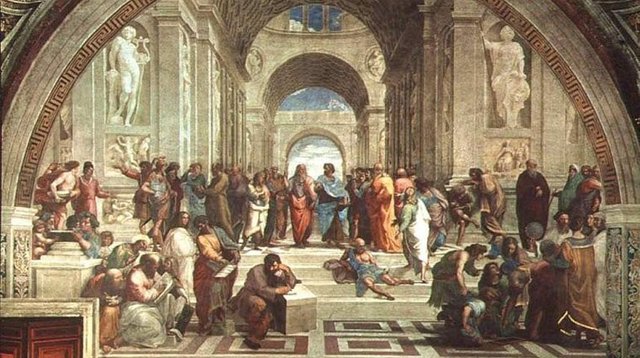Ancient philosophy. Anaxemander - about the boundaries of the world in space and time.
If Thales had a philosophical question about the basic single essence of the worldhood and the origin of the world, his fellow citizen, disciple and companion Anaxemander has already questioned the boundaries of the world in space and time. Anaxemander was born in Miletus in 611 BC. and died in 546. He, like Thales, manifested manifold scientific interests and subtle observability. Shortly before his death, he wrote a special philosophical work in prosaic form under the title "For Nature." Unfortunately, this piece of work was prematurely lost. A unique original statement by Anaxemander, delivered by the Simplicity / Philosopher of the Peripatetic School, born in Cilicia, has produced many philosophical commentaries, especially on Aristotle's works. He died in 549 BC.
Anaxemander is attributed to a number of scientific discoveries. He first made a geographic map of a metal plate, depicting the earth's surface floating in a great sea. It is attributed to the discovery of a special kind of sundial that not only determines the hours of the day, but also determines the annual time, summer sunny zenith, winter sunny zenith and equinox. Represents a vertical rod on a plane with three concentric circles. In summer zenith, the shadow reaches the innermost circle, at equinox to mid, and in winter to outermost. Anaxemander created the first globe, from which it is clear that he no longer imagined the earth as flat, but round. He imagined it as a cylinder whose height was three times less than the diameter of its lower and upper surface. Some authors point out that Anaxemander was involved in public affairs: for example, he reports that he was the leader of the Miletus, who moved and formed a colony in the Thracian town of Apollonia.
Anaxemander's observations indicated to him the inadequacy that Thales gave to the essence of the earth. So he does the same philosophical questions but deepens them and gives them another answer. He does not accept that the world can be made up of a specific limited and determined by its substance substance, such as water, because in the world there is an infinite variety of qualities. Moreover, the water is limited, and the world is endless. That is why he taught that the basic essence of the world compose a substance that is indefinite / unlimited / qualities and unlimited quantity. This substance he calls "apeiron", that is, indefinitely, indefinitely. Theophrastus testifies thus: "Anaxemander of Miles the son of Praxiad, a fellow-citizen of Tales, said that the beginning and the primary and fundamental element of things was infinite; he was the first to introduce this name for the beginning. He said that it was neither the water nor any of the so-called elements, but an excellent substance of them, which is infinite and from which all the heavens and worlds have become. "Indeterminate Anaximander determined that it was not derived and inexhaustible, immortal and indestructible, there are no limits in time, therefore it is eternal, neither in space, therefore it is infinite."

Another great text. Eternal world with countless shizofrenic wills of people tends to cause despair-like feelings that gave birth to infamous tragedies. Anaxemander truly was a great philosopher.
I upvoted your post.
Cheers to you.
@Pinoy
Posted using https://Steeming.com condenser site.